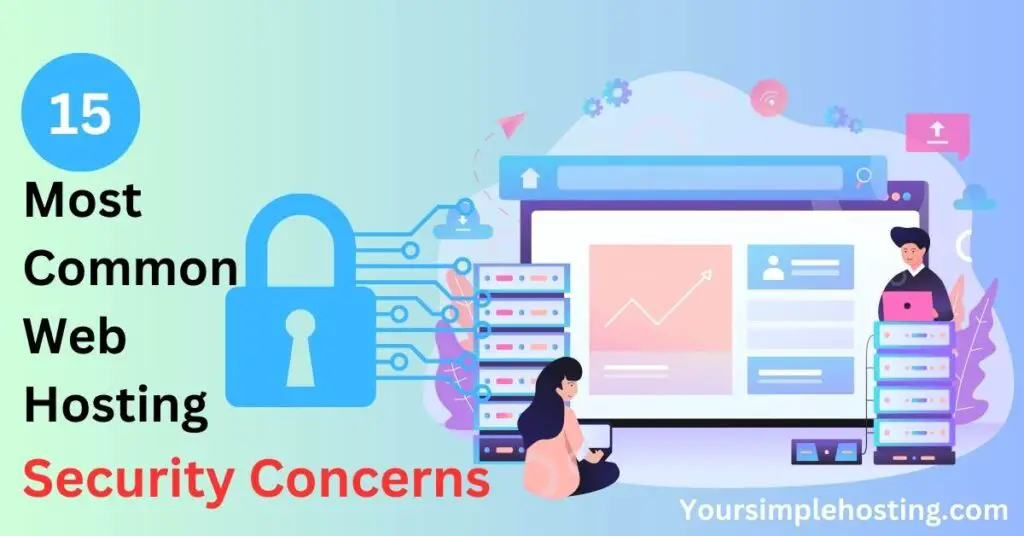In today’s digital age, web hosting security has become a significant concern for businesses and individuals.
With the rise of cyber attacks and data breaches, ensuring the security of your website is more important than ever. From protecting sensitive data to maintaining website availability, web hosting security encompasses many concerns.
Below, I’ll explore some common web hosting security concerns every website owner should know, so let’s jump right in.

Table of Contents
15 Common Web Hosting Security Concerns
Every website owner should know the common web hosting security concerns. Unfortunately, some people take the security of their websites lightly, which is their biggest mistake.
Whether you have a personal blog or conduct business online, you should prioritize your website’s security. Here’s a list of the common web hosting security concerns that you should be aware of:
1. Malware and Viruses
Two of the most common web hosting security concerns include malware and viruses. They can infect your website through malicious code injected into your website’s code, phishing emails, or outdated plugins or software.
Once injected, these two can steal your sensitive data or harm your website’s work.
2. DDoS Attacks
Distributed Denial of Service (DDoS) attacks involve overwhelming your website with traffic from multiple sources, causing it to crash and become unavailable.
DDoS attacks can be initiated by hackers or even competitors seeking to harm your business.
3. Weak Passwords
Hackers can easily guess or crack weak passwords, giving them access to sensitive information or control of your website. Therefore always choose strong passwords that can’t be easily guessed.
4. Outdated Software
Outdated software or plugins can also leave your website vulnerable to attacks. Hackers can exploit known vulnerabilities in outdated software to access your website.
5. SQL Injection
Some hackers specialize in SQL injections and attack websites with SQL databases.
Therefore, if your website uses this type of database, hackers can inject malicious code into it and access your sensitive data or gain complete control over your website.
6. Data Loss
Website owners can lose data because of hacking, hardware failure, or human error. Meaning you should regularly back up your data to ensure you can quickly restore it in case of data loss or cyber attacks.
7. Phishing
Phishing includes sending fraudulent emails masked as legitimate requests, such as financial transactions or password reset requests.
When you click on the link in the fraudulent emails, you will be taken to a fake website that steals your sensitive data, so stay vigilant and don’t open suspicious emails.
8. Brute Force Attacks
Brute force attacks involve automated tools that attempt to guess login credentials by trying multiple combinations of usernames and passwords.
In the case of weak passwords, these attacks can cause real damage.
9. File Inclusion Vulnerabilities
File inclusion vulnerabilities enable cybercriminals to add external files on websites to compromise their security.
The files included contain malicious code, and when injected into the website, this code can exploit this vulnerability.
10. Cross-Site Scripting (XSS)
Cross-Site Scripting attacks involve injecting malicious code into a website through forms, comments, or search bars.
Once injected, this code can be executed by unsuspecting website users, allowing the cybercriminal to gain control over the website or steal sensitive data.
11. Server Misconfigurations
Server misconfigurations can easily make websites vulnerable to cyber attacks.
They’re a common security problem, and examples of server misconfigurations include open ports, improperly set file permissions, or default login credentials that haven’t been changed.

12. Man-in-the-Middle Attacks (MITM)
These attacks include disrupting communication between a user and a website to steal sensitive data or take complete control of the website.
In our article What is a Man-in-the-Middle Attack? We go into more detail about the Man-in-the-Middle attacks.
13. Zero-Day Vulnerabilities
Have you heard of zero-day vulnerabilities?
They’re security flaws unknown to the software vendor or the public, and hackers can exploit these vulnerabilities to access websites that use the affected software.
14. Social Engineering
Social engineering involves manipulating people to reveal sensitive information or perform actions that compromise website security. Examples include phishing emails, phone scams, and pretexting.
15. Insufficient Logging and Monitoring
Insufficient logging and monitoring can make detecting and responding to security incidents difficult. Website owners may not know an attack has occurred without good logs and monitoring until it is too late.
In conclusion, website owners can protect their websites from cyber attacks and prevent data loss by taking the necessary security measures, such as using strong passwords, keeping software up to date, and regularly backing up data.
Frequently Asked Questions (FAQs)
Can web hosting be hacked?
Most web hosting providers have robust security measures in place. Unfortunately, web hosting can be hacked, especially if your website is hosted on a server vulnerable to malware injections, brute force attacks, etc.
That’s why you must pick a reliable web hosting provider. Moreover, as a responsible website owner, you should take security measures to keep your website safe.
For instance, you should use strong passwords, back up your data, update your plugins and software regularly, etc.
How do I secure my web hosting service?
You can secure your web hosting service in various ways, such as the following:
1. Use strong passwords that aren’t easy to guess. Moreover, don’t use the same password for all your accounts associated with your web hosting service.
2. Update your software and plugins to ensure the latest security measures back them.
3. Back up your data regularly to prevent data loss in case of hardware failure or a cyber attack.
4. Use SSL certificates to encrypt information moved between your users and your website.
5. Turn on firewalls and other security measures offered by your hosting service.
6. Observe your website’s traffic and logs regularly to notice unusual activity.
Is it safe to use free hosting?
Free hosting can seem appealing to new website owners, and while you can find good free hosting, most aren’t safe.
Remember that free hosting providers don’t have the same security measures as paid ones. Additionally, they have limited resources.
Lastly, most free hosting providers collect data from your website and place ads, which can annoy your users and compromise your website’s privacy.
Conclusion
Everyone should take the security of their website seriously, as many cyber criminals look for vulnerabilities they can exploit.
Whether running a small personal blog or a large e-commerce business, you should prioritize security over everything else.
Learning about common web hosting security concerns can protect your website from cyber attacks and keep your sensitive data and users safe.
Remember that ensuring the safety of your website can help you keep the trust of your users and grow your business.

Leave a Reply